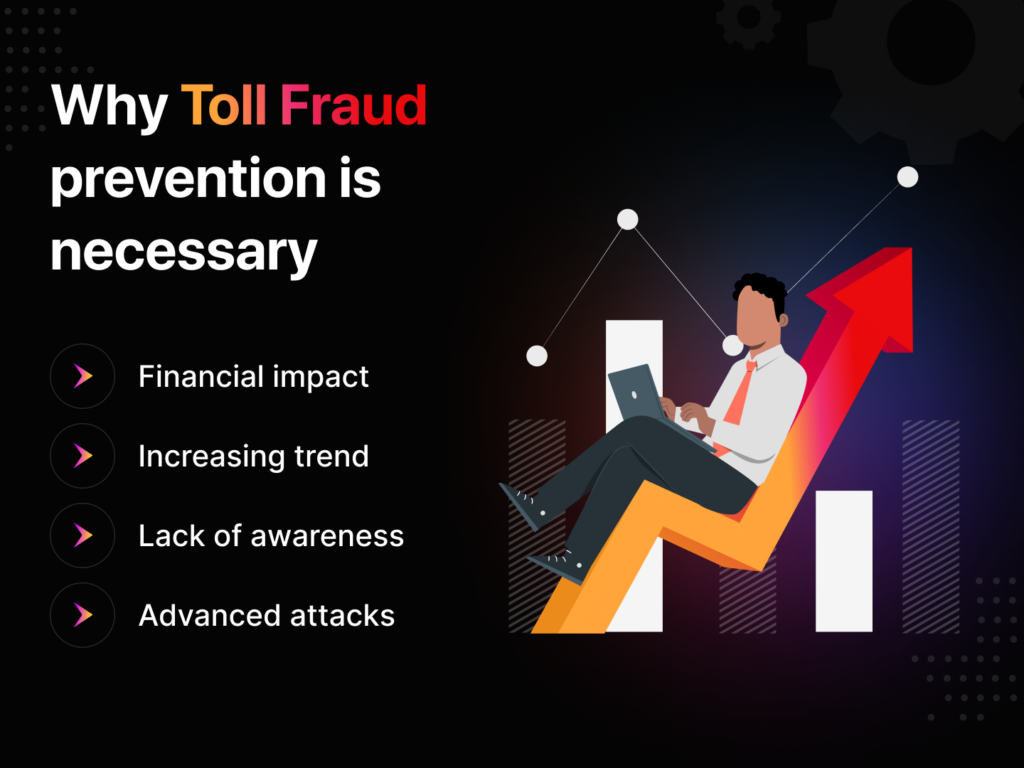Why Toll Fraud Prevention is necessary
The main point here is that it is necessary to prevent toll fraud before it happens since once you become a victim, you can’t undo the harm. Simply said, prevention is the priority.
Financial impact
Toll fraud is a severe problem that costs an enormous amount of money. According to the CFCA, it’s estimated that this issue causes about $27 billion in phone bills every year worldwide.
Increasing trend
With a 15% increase yearly, it’s clear that toll fraud is becoming a more severe problem, and businesses are becoming increasingly vulnerable to these attacks without appropriate security measures.
Lack of awareness
Many firms are either ignorant of the problem of toll fraud or lack the necessary safety measures. 84% of US companies are vulnerable to cybercrime in 2023, including various types of fraud, noting the importance of training and prevention actions.
Advanced attacks
Toll fraud attacks are well-organized and automated, making them somewhat impossible to detect. They frequently happen outside normal business hours, making identification considerably more difficult.
This highlights the significance of effective security systems monitoring and responding to suspicious behavior.
More on how to prevent it
Toll fraud prevention and detection are vital since this practice can impact a company’s finances, reputation, and relationships with workers, customers, and the general public.
In today’s world, it’s quite challenging to stop it since hackers are always trying to develop more advanced methods, making it paramount to stay informed and vigilant about potential business vulnerabilities.
Here are the most important toll fraud protection measures you can implement:
- Restrict international calling: If your company doesn’t need international calls, limit international calling on your phone system and through your phone carrier to avoid unwanted foreign calls.
- Block Caribbean countries: Some Caribbean countries don’t use the 011 international dialing code but follow the North American dialing plan. To prevent toll fraud, block calls to these Caribbean countries.There are 18 area codes to consider, including 242, 649, 345, 876, 809, 787, 340, 264, 284, 869, 268, 664, 767, 758, 784, 473, 246, and 868. Block these area codes unless your business genuinely needs to call them
- Network segmentation: Ensure your company telephone system is hosted on a separate white network from your data network. This isolation makes it harder for hackers to exploit vulnerabilities.
- Limit information sharing: Never give technical details about your PDX (Private Branch Exchange) system to anybody outside the company, as this information is often used maliciously.
- Password management: Use strong and unique passwords instead of using factory or default passwords on your system. Verify your system frequently to check for no unauthorized or extra passwords.
- International call blocking: To prevent fraudulent international calls, set international call blocking on your system if it isn’t necessary for your business operations.
- Mailbox security: Regularly lock or disable unused mailboxes in your system to reduce potential entry points for hackers.
- Avoid predictable PINs: Instruct employees not to use predictable PINs for voicemail access, such as the final digits of their direct dial numbers, sequential numbers like “111,” or incremental numbers like “1234”.
- Privacy practices: Never publish employees’ names and phone numbers online since attackers can exploit this information to target your system.
- Voicemail lockout: To add extra protection, set your system to lock a voicemail box after three failed login attempts.
In addition to the previously stated safety measures, companies can improve communication security by using SMS API providers such as Textgrid, recognized for their strict security features based on HIPAA.
This helps protect your company’s communications, such as SMS and messaging services and guarantees that only authorized individuals may access their systems.








